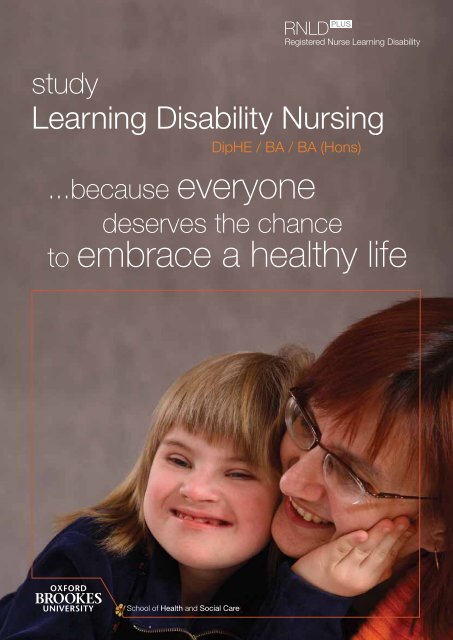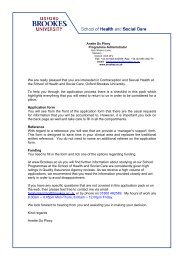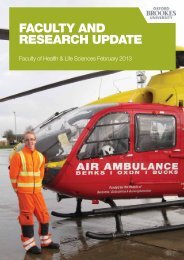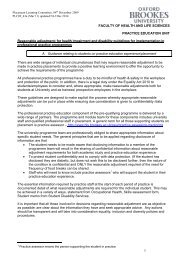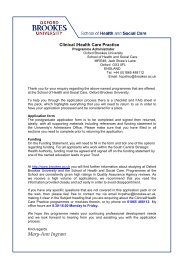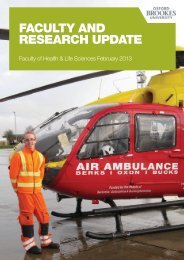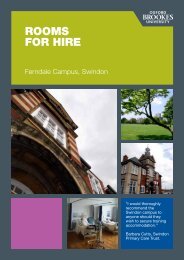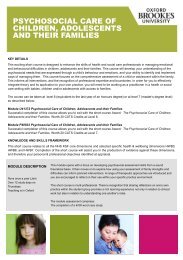to embrace a healthy life - Faculty of Health and Life Sciences
to embrace a healthy life - Faculty of Health and Life Sciences
to embrace a healthy life - Faculty of Health and Life Sciences
Create successful ePaper yourself
Turn your PDF publications into a flip-book with our unique Google optimized e-Paper software.
RNLD PLUS<br />
Registered Nurse Learning Disability<br />
study<br />
Learning Disability Nursing<br />
DipHE / BA / BA (Hons)<br />
...because everyone<br />
deserves the chance<br />
<strong>to</strong> <strong>embrace</strong> a <strong>healthy</strong> <strong>life</strong><br />
School <strong>of</strong> <strong>Health</strong> <strong>and</strong> Social Care
What is Learning<br />
Disability Nursing?<br />
Pho<strong>to</strong>: 2008<br />
RNLD PLUS<br />
As a Registered Nurse in Learning Disability (RNLD), you will be<br />
embarking on a very varied <strong>and</strong> satisfying career. You will be<br />
concerned with the holistic health <strong>and</strong> social needs <strong>of</strong> people<br />
who have a learning disability (<strong>of</strong> which there are about 1.5<br />
million in Engl<strong>and</strong>). This group in society is at greatest risk <strong>of</strong> early<br />
preventable death, <strong>and</strong> many have multiple <strong>and</strong> complex health<br />
needs <strong>and</strong> therefore require the additional <strong>and</strong> specialist support<br />
that the RNLD can provide.<br />
The Learning Disability Nursing course <strong>of</strong>fered by Oxford Brookes<br />
University is a particularly exciting one as it <strong>of</strong>fers an optional<br />
element for specialist study in the third year <strong>of</strong> the course, known<br />
as RNLD PLUS . The range <strong>of</strong> career pathways <strong>and</strong> opportunities that<br />
are now available in the learning disability fi eld are very diverse. This<br />
unique course design allows you <strong>to</strong> select a specifi c focus <strong>of</strong> study<br />
in your fi nal year, <strong>and</strong> <strong>to</strong> develop enhanced skills <strong>and</strong> knowledge in<br />
a chosen area, such as multiple <strong>and</strong> pr<strong>of</strong>ound disability, epilepsy or<br />
challenging behaviour, through targeted placements, assignment<br />
focus <strong>and</strong> choice <strong>of</strong> modules.<br />
Many <strong>of</strong> the people you meet who have a learning disability will<br />
also have social needs, <strong>and</strong> consequently the RNLD needs <strong>to</strong> be<br />
fl exible <strong>and</strong> <strong>to</strong> frequently cross the boundaries between health <strong>and</strong><br />
social care.<br />
About the course<br />
Learning Disability Nursing can be studied at diploma<br />
*<br />
or degree<br />
level. Our courses start in September <strong>and</strong> taught at our Mars<strong>to</strong>n<br />
Road site, which is part <strong>of</strong> the Heading<strong>to</strong>n Campus. The course<br />
length is three years full-time or up <strong>to</strong> a maximum <strong>of</strong> seven years if<br />
part-time.<br />
Our course aims <strong>to</strong> provide a balance between theoretical <strong>and</strong><br />
practical modules.<br />
Your fi rst year will provide you with an introduction <strong>to</strong> human<br />
physiology <strong>and</strong> ana<strong>to</strong>my, <strong>and</strong> a foundation in important aspects<br />
<strong>of</strong> learning disability nursing. You will also start <strong>to</strong> acquire the<br />
pr<strong>of</strong>essional skills you will need <strong>to</strong> work in an interpr<strong>of</strong>essional<br />
context.<br />
Your second <strong>and</strong> third year modules will build on this foundation<br />
<strong>and</strong> cover a range <strong>of</strong> <strong>to</strong>pics, including:<br />
• physical <strong>and</strong> mental health needs<br />
• clinical conditions <strong>and</strong> complex needs<br />
• advocacy <strong>and</strong> empowerment<br />
• therapeutic relationships <strong>and</strong> interventions<br />
• social policy <strong>and</strong> inclusion<br />
• cultural issues<br />
• law <strong>and</strong> ethics<br />
• management.<br />
At the end <strong>of</strong> the course you will become a Registered Nurse -<br />
Learning Disability (RNLD).<br />
People with a learning disability are cared for in many different<br />
settings these days, so an RNLD may work in the NHS, social<br />
services, special schools or in the private or voluntary sec<strong>to</strong>r.<br />
The Learning Disability Nursing course runs in collaboration with<br />
the Ridgeway Partnership (one <strong>of</strong> only two specialist NHS trusts in<br />
Engl<strong>and</strong>). It will equip you with the up-<strong>to</strong>-date knowledge <strong>and</strong> skills<br />
needed for this challenging but highly rewarding fi eld <strong>of</strong> nursing.<br />
You will work with children <strong>and</strong> adults with a learning disability in<br />
their home, school or working environment.<br />
Learning disability nursing requires a high level <strong>of</strong> skill <strong>and</strong><br />
resourcefulness. The course is based on the principle that all<br />
people have physical, psychological, social <strong>and</strong> spiritual needs <strong>and</strong><br />
are therefore unique <strong>and</strong> dynamic individuals with inherent potential<br />
for growth <strong>and</strong> development.<br />
The feedback from local employers on the quality <strong>of</strong> our graduates<br />
has been very positive commenting that our graduates use<br />
excellent communication skills <strong>and</strong> person-centred approaches that<br />
work well in many health <strong>and</strong> social care services.<br />
Teaching, learning <strong>and</strong> assessment<br />
Oxford Brookes continues <strong>to</strong> improve its position in the league<br />
tables due <strong>to</strong> good graduate prospects <strong>and</strong> strong satisfaction<br />
ratings (The Times Good University Guide 2010).<br />
You will experience a variety <strong>of</strong> different approaches <strong>to</strong> teaching <strong>and</strong><br />
learning, from traditional lectures <strong>and</strong> seminars <strong>to</strong> group work <strong>and</strong><br />
practical sessions in our modern clinical skills suites. Assessment<br />
methods also vary from module <strong>to</strong> module <strong>and</strong> are largely assessed<br />
by coursework <strong>and</strong>/or practice assessment.<br />
Oxford Brookes teaches a very wide range <strong>of</strong> pre-qualifi cation<br />
courses, which include all branches <strong>of</strong> nursing, midwifery,<br />
occupational therapy, operating department practice, osteopathy,<br />
paramedic emergency care, physiotherapy <strong>and</strong> social work. This<br />
gives the course a strong multipr<strong>of</strong>essional focus, <strong>and</strong> you will<br />
have many opportunities <strong>to</strong> share your learning with students from<br />
other nursing <strong>and</strong> health <strong>and</strong> social care pr<strong>of</strong>essions. This is a<br />
key component <strong>of</strong> the course, as it is essential <strong>to</strong> developing your<br />
teamwork skills <strong>and</strong> your underst<strong>and</strong>ing <strong>of</strong> the other roles you will<br />
encounter in practice.<br />
The school <strong>of</strong>fers a very friendly <strong>and</strong> supportive environment in<br />
which <strong>to</strong> learn. We have excellent teaching facilities including state<strong>of</strong>-the-art<br />
AVA classroom <strong>and</strong> lecture theatre facilities, dedicated<br />
clinical skills suites <strong>and</strong> simulation resources, which include a family<br />
<strong>of</strong> computerised simulation manikins, ana<strong>to</strong>my models <strong>and</strong> fully<br />
networked computer rooms.<br />
*<br />
See the enclosed information regarding the NMC<br />
Review <strong>of</strong> Pre-registration Nursing Education.
Teaching also takes place in our dedicated communication<br />
suite. This versatile environment can be adapted <strong>to</strong> simulate a<br />
range <strong>of</strong> scenarios that you will experience in a ‘real <strong>life</strong>’ practice<br />
environment. We also have excellent library resources, accessible<br />
both through the web <strong>and</strong> through a range <strong>of</strong> locally based facilities<br />
on university <strong>and</strong> NHS sites. Teaching is supported by e-learning<br />
through Brookes Virtual an extensive range <strong>of</strong> online resources <strong>to</strong><br />
support your learning.<br />
Work placements<br />
Your practice experience will involve working with children, adults<br />
<strong>and</strong> older people who have a learning disability. These individuals<br />
will have a variety <strong>of</strong> needs, <strong>and</strong> you will work in a range <strong>of</strong> different<br />
settings. Placements will be supervised by a range <strong>of</strong> health <strong>and</strong><br />
social care practitioners.<br />
RNLD PLUS<br />
All our courses adopt a student-centred approach <strong>to</strong> teaching <strong>and</strong><br />
learning <strong>and</strong> are strongly focused on encouraging every student <strong>to</strong><br />
attain their full potential as <strong>life</strong>long learners. This is achieved through<br />
a range <strong>of</strong> student support mechanisms, such as academic<br />
advisors, student support co-ordina<strong>to</strong>rs, Upgrade <strong>and</strong> the student<br />
disability service. Whilst on placement, you will be supported by link<br />
lecturers, a placement team <strong>and</strong> a practice assessor.<br />
What is RNLD PLUS ?<br />
The career pathways <strong>of</strong> learning disability nurses are many <strong>and</strong> varied. We also know that many <strong>of</strong> our students have or develop a specifi c<br />
interest in a particular pr<strong>of</strong>essional role, preferred client group or special work environment.<br />
In response <strong>to</strong> this, Oxford Brookes University has developed RNLD PLUS . This model <strong>of</strong> course delivery allows an enhanced focus <strong>of</strong> study<br />
<strong>and</strong> practice for students in their fi nal year, allowing them maximum preparation for their chosen career pathway, clinical specialty or care<br />
environment.<br />
It is important <strong>to</strong> note this is an option, <strong>and</strong> not compulsory. Students can follow the st<strong>and</strong>ard course <strong>and</strong> still qualify as usual.<br />
How does it work?<br />
All students take the current Learning Disability Nursing course.<br />
For those who wish <strong>to</strong>, we will <strong>of</strong>fer the option <strong>of</strong> specialisation in<br />
the third <strong>and</strong> fi nal year <strong>of</strong> the course.<br />
You will be asked <strong>to</strong> specify your preference for a theme / focus<br />
/ specialism by the end <strong>of</strong> Semester 1 in your second year. This<br />
choice would then be refl ected in:<br />
1. Placement area during your third year<br />
2. Topic for assignments <strong>of</strong> all Year 3 modules<br />
3. The <strong>to</strong>pic <strong>of</strong> an independent study<br />
4. Choice <strong>of</strong> optional module(s) from other fi elds/programmes<br />
5. Choice <strong>of</strong> <strong>to</strong>pic for dissertation.<br />
What are the advantages?<br />
RNLD PLUS will therefore <strong>of</strong>fer the following benefi ts compared with<br />
other courses:<br />
1. Graduates are better equipped <strong>to</strong> meet the complex health<br />
<strong>and</strong> social needs <strong>of</strong> people with a learning disability.<br />
2. RNLD PLUS is a response <strong>to</strong> the increased post-qualifying<br />
specialisation in Learning Disability services <strong>and</strong> the range <strong>of</strong><br />
possible pr<strong>of</strong>essional roles <strong>and</strong> career pathways for RNLDs.<br />
3. RNLD PLUS allows an additional focus on specifi c skills,<br />
knowledge <strong>and</strong> practice experience with particular client<br />
groups or specifi c service settings.<br />
4. The chance <strong>to</strong> develop <strong>and</strong> enhance specialist knowledge<br />
<strong>and</strong> competence before entering the job market.<br />
5. Offers alternative option <strong>to</strong> those courses that <strong>of</strong>fer joint<br />
Social Work / RNLD designs.<br />
What choices are there?<br />
There are a number <strong>of</strong> themes that can be chosen in your fi nal year,<br />
ranging from a focus on secure environments <strong>and</strong> forensic units<br />
<strong>to</strong> managing neurological <strong>and</strong> chronic conditions <strong>to</strong> palliative <strong>and</strong><br />
hospice care.<br />
6. Graduates who have undertaken the RNLD PLUS are<br />
more attractive <strong>to</strong> some employers in health <strong>and</strong> social care<br />
services, as they have developed additional knowledge <strong>and</strong><br />
skills without losing essential <strong>and</strong> core generic skills <strong>and</strong><br />
knowledge.
How <strong>to</strong> apply<br />
Full-time: Applications through UCAS<br />
Part-time: Direct <strong>to</strong> the university by contacting the Programme<br />
Administra<strong>to</strong>r.<br />
RNLD PLUS<br />
Specifi c entry requirements<br />
Diploma: 5 GCSEs at grade C or above including English,<br />
Mathematics <strong>and</strong> a science subject or academic equivalent.<br />
Degree: All the above qualifi cations for the Diploma course, plus<br />
three A-levels at C grade or above, or academic equivalent.<br />
Pho<strong>to</strong>: 2008<br />
UCAS codes<br />
Diploma: 3260 DipN/LDN<br />
Institution: 066<br />
Open days<br />
Degree: B703 BA/NL<br />
Institution code name: OXFD<br />
Please check our school website regularly where details <strong>of</strong> our<br />
open days will be advertised. If you would like <strong>to</strong> have a <strong>to</strong>ur <strong>of</strong> the<br />
University campus, please contact the enquiry centre on<br />
+44 (0) 1865 484848, <strong>to</strong> make the necessary arrangements.<br />
Additionally: All applicants must be screened for fi tness for practice.<br />
A Criminal Records Bureau (CRB) <strong>and</strong> Independent Safeguard<br />
Authority (ISA) check will be undertaken.<br />
Useful contacts<br />
Programme Administra<strong>to</strong>r<br />
Tel: +44 (0) 1865 482830<br />
Email: learningdisabilitynursing@brookes.ac.uk<br />
Website: http://shsc.brookes.ac.uk<br />
Senior Tu<strong>to</strong>r (admissions enquiries only)<br />
Tel: +44 (0) 1865 482587<br />
Email: shsc_seniortu<strong>to</strong>rs@brookes.ac.uk<br />
Heading<strong>to</strong>n Campus Tours<br />
Tel: +44 (0) 1865 484848<br />
Email: query@brookes.ac.uk<br />
Oxford Brookes University<br />
Website: www.brookes.ac.uk<br />
Ridgeway Partnership<br />
(Oxfordshire Learning Disability NHS Trust)<br />
Tel: +44 (0) 1865 747455<br />
Email: enquiries@ridgeway.nhs.uk<br />
Website: www.ridgeway.nhs.uk<br />
UCAS (Cus<strong>to</strong>mer Service Unit):<br />
Tel: +44 (0) 871 4680468<br />
Email: enquiries@ucas.ac.uk<br />
Website: www.ucas.com<br />
School <strong>of</strong> <strong>Health</strong> <strong>and</strong> Social Care<br />
Oxford Brookes University<br />
Jack Straw’s Lane<br />
Mars<strong>to</strong>n<br />
Oxford, OX3 0FL<br />
Tel: +44 (0) 1865 482600<br />
Email: programmesshsc@brookes.ac.uk<br />
Accommodation Offi ce<br />
Tel: +44 (0) 1865 484660<br />
Email: accomm@brookes.ac.uk<br />
Webpage: www.brookes.ac.uk/studying/accommodation<br />
Student Finance<br />
Tel: +44 (0) 1865 483088<br />
Email: fi nance-fees@brookes.ac.uk<br />
Webpage: www.brookes.ac.uk/studying/fi nance<br />
NHS Student Bursaries:<br />
Tel: +44 (0) 845 358 6655<br />
Website: www.nhsbsa.nhs.uk/students/816.aspx<br />
To obtain a large-print copy <strong>of</strong> (or sections <strong>of</strong>) this publication or <strong>to</strong> enquire about other formats,<br />
please contact +44 (0) 1865 484848 or email query@brookes.ac.uk<br />
Oxford Brookes University <strong>and</strong> the School <strong>of</strong> <strong>Health</strong> <strong>and</strong> Social Care actively support equality in education <strong>and</strong> welcome applications from all<br />
people representative <strong>of</strong> our diverse community. For more details please visit www.brookes.ac.uk/services/hr/eod<br />
or phone +44 (0) 1865 485929<br />
100409_2610


